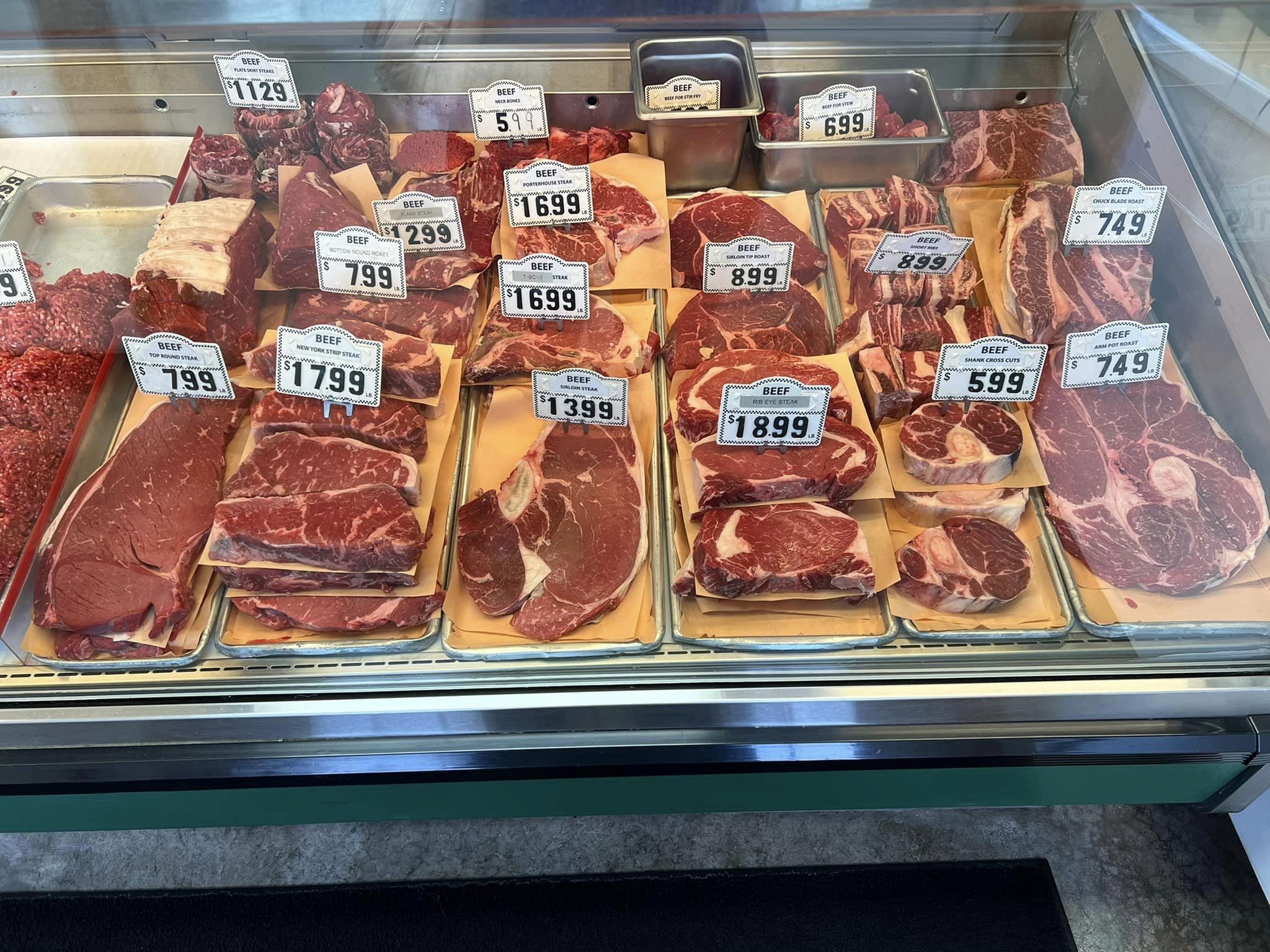Bagley Meat Market Edwardsville IL: Offering the Finest Meat Selection for Every Meal
Bagley Meat Market Edwardsville IL: Offering the Finest Meat Selection for Every Meal
Blog Article
Why Shopping at a Local Meat Market Guarantees Fresh, High-Quality Cuts
Purchasing at a regional meat market uses distinctive advantages that commonly go unnoticed by customers accustomed to bigger retail chains. The ramifications of choosing neighborhood expand past instant benefits, triggering a more detailed examination of what this choice really implies for both consumers and the local economy.
Benefits of Local Sourcing
In the realm of food procurement, the advantages of regional sourcing stick out prominently. By acquiring meat from neighborhood markets, consumers acquire direct accessibility to products that are often fresher and extra delicious than those discovered in bigger, commercial grocery stores. Neighborhood sourcing minimizes the time and range food travels from ranch to table, which not only boosts taste but additionally protects dietary worth.

Furthermore, local sourcing typically offers transparency pertaining to the beginnings of the meat. Customers can ask about the farming techniques used, pet well-being requirements, and whether the meat is organic or grass-fed. This info equips buyers to make educated decisions straightened with their values.
High Quality Control Standards
Regional meat markets commonly stick to extensive quality assurance requirements that make certain the items provided satisfy high safety and quality benchmarks. These criteria commonly include various stages of the meat production procedure, from sourcing to taking care of and storage.
First, regional markets frequently establish rigorous distributor requirements, ensuring that just trusted farms and manufacturers are made use of - bagley meat market edwardsville il. This decreases the chance of contamination and advertises higher pet welfare standards. Furthermore, lots of local meat markets carry out routine inspections to confirm that the meat is processed under hygienic conditions, better decreasing wellness dangers
Temperature control is one more critical facet of quality control. Regional meat markets regularly keep track of refrigeration systems to keep optimal storage temperatures, guaranteeing that meat stays fresh and secure for consumption. Additionally, the execution of traceability systems allows markets to track the origin of their products, giving transparency and responsibility.
Lastly, personnel at local meat markets are often educated to identify signs of spoilage and understand appropriate handling methods. This dedication to quality assurance not only elevates the overall criterion of the meat yet also cultivates customer trust fund, making local meat markets a trustworthy source for high-quality cuts.
Supporting Local Farmers
Sustaining local farmers is vital for cultivating a sustainable food system and enhancing community resilience. When consumers pick to patronize neighborhood meat markets, they directly contribute to the resources of farmers in their region. This not only sustains the neighborhood economic climate however also enhances the farming sector, guaranteeing that it stays feasible and dynamic.


Additionally, supporting regional farmers promotes a sense of neighborhood and link in between customers and manufacturers. It motivates openness in food sourcing and infuses trust, as consumers can establish connections with the people who elevate their food. This straight connection eventually causes a much more engaged and informed public, which is critical for address promoting for lasting agricultural practices in the future.
Sustainable Practices
Lasting techniques in meat markets play a vital function in promoting ecological stewardship and making certain animal welfare. Neighborhood meat markets frequently focus on sourcing their products from farms that execute sustainable and ethical farming approaches. These practices consist of rotational grazing, which helps preserve soil health and reduces carbon discharges, alongside reducing the use of anti-biotics and hormonal agents in animals.
In addition, local meat markets usually stress transparency in their supply chains. Customers are provided with info relating to the origin of their meat, allowing them to make informed choices that align with their values. By sustaining neighborhood farmers that practice lasting techniques, customers add to the conservation of biodiversity and the reduction of transport discharges connected with long-distance meat distribution.
In addition, numerous local meat markets take part in waste reduction techniques, such as making use of every component of the animal this contact form and promoting off-cuts that might or else go unsold. By promoting a much more lasting approach to meat intake, these markets not only supply top quality products however likewise contribute favorably to the setting and animal welfare. Fundamentally, purchasing at a neighborhood meat market aligns customers with a broader activity in the direction of ethical and accountable food sourcing.
Individualized Customer Support
Purchasing at a meat market usually encompasses greater than simply the products used; it is also about the experience and the relationships developed between clients and personnel. Personalized customer care is a trademark of local meat markets, setting them besides larger grocery chains. Well-informed staff take the time to recognize individual client choices, ensuring that each browse through is tailored to certain requirements.
Consumers take advantage of professional recommendations on cuts, cooking methods, and prep work tips, promoting a sense of depend on and commitment. This individualized interaction allows clients to ask inquiries and seek suggestions, bring about notified acquiring choices. Employee commonly remember routine clients and their preferences, creating an inviting environment that cultivates area connections.
In addition, tailored solution includes unique requests, such as custom cuts or certain prep work approaches, which larger sellers might not fit. This level of attention reinforces the dedication of regional meat markets to quality and customer satisfaction.
Fundamentally, individualized customer care not just boosts the buying experience however likewise ensures that consumers leave with the most effective items suited to their culinary demands, making every see a rewarding one.
Verdict
Supporting local farmers fosters area partnerships and reinforces the local economy, hop over to here while lasting methods contribute to environmental stewardship. Furthermore, customized customer service improves the buying experience, making local meat markets a recommended choice for customers looking for both high quality and ethical considerations in their food sourcing.
The effects of selecting neighborhood expand beyond immediate benefits, prompting a better exam of what this option genuinely indicates for both customers and the neighborhood economy.
Supporting regional meat markets additionally contributes to the local economic situation. Local meat markets often keep an eye on refrigeration systems to preserve optimal storage temperature levels, making certain that meat stays risk-free and fresh for usage.Regional farmers are frequently a lot more attuned to the particular needs of their communities, growing crops and raising livestock that line up with local preferences and preferences. Supporting local farmers promotes community relationships and enhances the neighborhood economic situation, while sustainable practices add to environmental stewardship.
Report this page